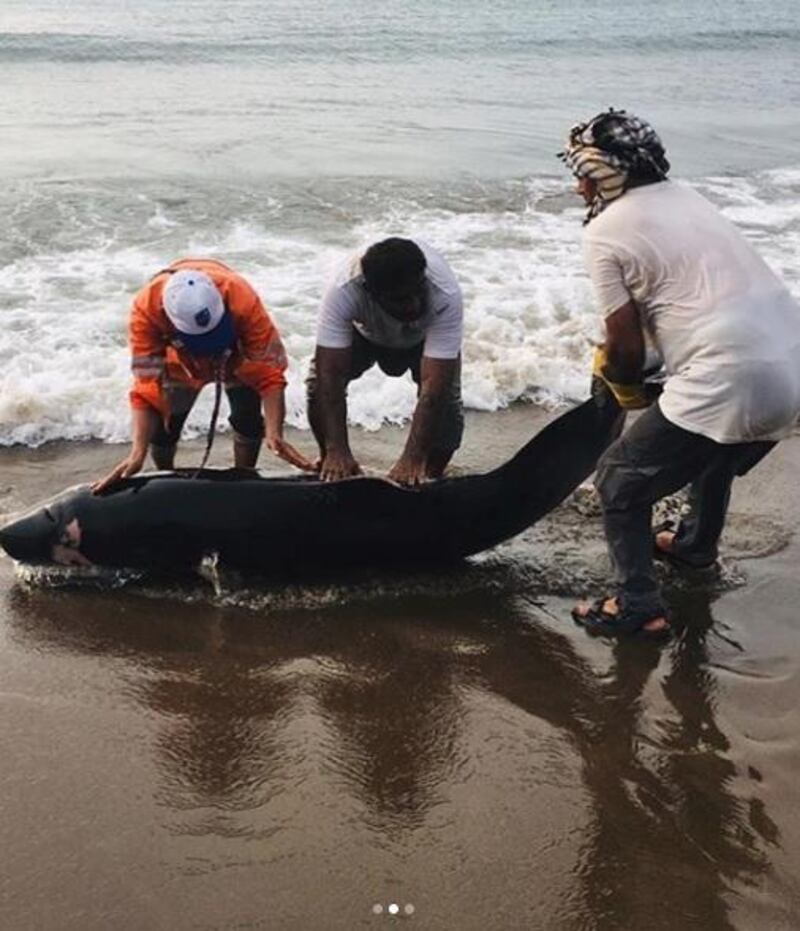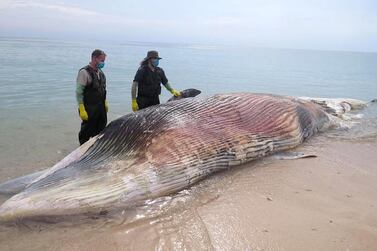The body of one of the world’s rarest and smallest species of whales has been found beached in Fujairah.
A carcass of a dwarf sperm whale was recovered by members of Fujairah Municipality.
Marine experts said it was just the third sighting of the mammal, smaller than some dolphins, in the Emirates over the past 14 years.
The creature was first recorded near the Al Bidya coast in Fujairah in 2005, with a second sighting at Jebel Ali, Dubai, five years later.
It was discovered by the municipality team on Saturday, June 29 but was buried before tests could be carried to determine its cause of death.
A UAE conservationist said the animals, also known as kogia whales, are often hunted and are also under threat from boat strikes and marine debris.
Dr Ada Natoli, founder and director of the UAE Dolphin Project, said such incidents are regrettable and it was “unfortunate” the carcass could not be retrieved to carry out vital research.
“More awareness about the crucial value of stranding is needed across all the public authorities, especially the waste management departments, to ensure that they will not go wasted,” she said.
Dr Natoli said she was in contact with Fujairah Municipality and managed to identify the whale’s species.
“There are two species of kogia recognised worldwide – pygmy sperm whales and dwarf sperm whales. We identified this as dwarf sperm whale.
“Both are very rare species and very little is known about them.
“They are found in tropical and temperate waters worldwide and live mainly in open waters of the continental shelf or shelf-edge.”
Natalie Banks, a UAE marine conservationist, said most of the information gleaned about the species came from those found washed up.
She said that they are between 2 to 2.7 metres in length, weigh between 135 kilograms to 272kg and can live up to 22 years.
“The dwarf sperm whale has a slow-moving, porpoise-like build that is brown, dark-grey or blue-grey in colour with a lighter-grey underside, and a pale, crescent-shaped mark between the eye and the flipper, sometimes called a ‘fake gill’ because it looks similar to a fish’s gill cover,” Ms Banks said.
“It has a high dorsal fin halfway down the length of the body that is taller and closer to the head than it is in the pygmy sperm whale. They also have the shortest snouts of any modern-day whale.”
Ms Banks said that the dwarf sperm whale mainly eats squid, and can be found in small pods.
“The dwarf sperm whale is one of the most commonly beached deep-diving whales in the world, although they are rarely seen at sea,” she said.
“These whales generally only come to the water’s surface when the sea and weather conditions are very calm.
“As a result, most of what is known of the whale comes from beached individuals.”
Ms Banks said that many of these stranded whales have died from parasitic infestations or heart failure.
“No global population estimate has been made, and so its conservation status by the International Union for Conservation of Nature is data deficient.”
Fujairah Whale and Dolphin Research Project posted photos and videos of the dwarf sperm whale’s remains to social media.
“Unfortunately the municipality buried the carcass before we could reach it in time,” the group said on its Instagram account. “We tried our best to relocate it to be exhumed for a necropsy but sadly this was not possible.”
A deceased dwarf sperm whale (Kogia sima) was stranded on the shores of Fujairah last weekend. This is only the third record of this species in the UAE. For more details please go to our Facebook or Instagram pages. Video credit: Janitha Nuwan pic.twitter.com/HVTsk9zzMc
— Fujairahwhaleproject (@fujairahwhales) July 4, 2019
In March, a carcass of a 12-metre Bryde's whale was found floating near Sir Bu Nair island off Sharjah.
The authorities said the mammal was towed to shore to enable experts to establish the cause of death.







